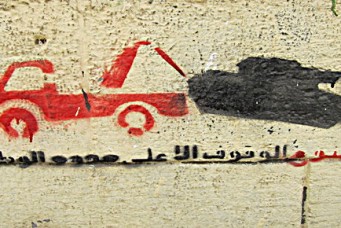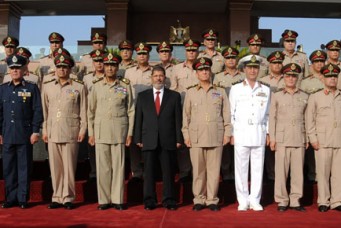The SCAF: An Overview of its Actions
On February 10, 2011, Egypt’s Supreme Council of the Armed Forces (SCAF) met for the first time without its chairman, former president Hosni Mubarak. It issued a communiqué indicating that Mubarak was preparing to relinquish his powers to the military after eighteen days of massive antigovernment protests. The SCAF’s first statement signaling the power transition assured the Egyptian public that the council would remain in continuous session in order to ensure the protection of the people and nation, and that it would support the legitimate demands of the protesters who had called for Mubarak’s overthrow.

On February 10, 2011, Egypt’s Supreme Council of the Armed Forces (SCAF) met for the first time without its chairman, former president Hosni Mubarak. It issued a communiqué indicating that Mubarak was preparing to relinquish his powers to the military after eighteen days of massive antigovernment protests. The SCAF’s first statement signaling the power transition assured the Egyptian public that the council would remain in continuous session in order to ensure the protection of the people and nation, and that it would support the legitimate demands of the protesters who had called for Mubarak’s overthrow.
On February 11, newly appointed Vice President Omar Suleiman announced that Mubarak had resigned and the council had taken over the administration of Egypt. This was a new role for the SCAF. The body has been in existence at least since the presidency of Anwar Sadat but only convened at the request of the president to provide advice on military matters—not to make autonomous decisions.
Created to operate quietly, the SCAF immediately was plunged into the highly political role of running the country in the interim period and shaping the transition. And as the transition has gone on, the SCAF has become far more political, which is especially evident in its contradictory and political statements made in the past two months. This political role has started undermining the SCAF’s image as defender of the Egyptian people and their revolutionary aspirations.
All council members are high-ranking military officers. They include some who occupy political positions in the Ministry of Defense, including the defense minister and commander in chief, Field Marshal Mohamed Hussein Tantawi, and five assistant ministers; others have command positions in the military, including the chief of staff and the commanders of the different military services.
Since the SCAF took over power in February 2011, not all members have shared the spotlight equally, with a handful of members making the majority of press statements and media appearances. In addition to Field Marshal Tantawi and the SCAF’s deputy chairman Lieutenant General Sami Hafez Anan, the most vocal members of the SCAF have been the assistant secretaries of defense. The ten commanders of the different military divisions have been far less political and have not made many public statements.
A list of the nineteen members of the SCAF is provided below, with the first eight being the most outspoken:
Field Marshal Mohamed Hussein Tantawi (chairman): commander in chief of the Egyptian Armed Forces and minister of defense and military production
Lieutenant General Sami Hafez Anan (deputy chairman): chief of staff of the Egyptian Armed Forces
Major General Mamdouh Shaheen: Assistant defense minister for legal and constitutional affairs
Major General Mukhtar al-Mulla: Assistant defense minister
Major General Mohsen al-Fanagry: Assistant defense minister and chairman of management and administration
Major General Mohamed al-Asaar: Assistant defense minister for armament
Major General Adel Amara: Assistant defense minister
Major General Ismail Othman: director of the Egyptian Armed Forces’ Morale Affairs Department
Vice Admiral Mohab Mamish: commander in chief of the Egyptian Navy
Air Marshal Reda Mahmoud Hafez Mohamed: commander of the Egyptian Air Force
Lieutenant General Abdul Aziz Seif al-Din: commander of the Egyptian Air Defense Force
Major General Ahmed Yousef Abd al-Nabi: commander of the Border Guard
Major General Mohamed Saber Attia: chief of operations for the Egyptian Armed Forces
Major General Mahmoud Hegazy: commander of the Second Field Army
Major General Sedky Sobhy: commander of the Third Field Army
Major General Hassan al-Rowini: commander of the Central Military Zone
Major General Nabil Mohamed Fahmy: commander of the Northern Military Zone
Major General Mohsen al-Shazly: commander of the Southern Military Zone
Major General Medhat al-Nahaas: commander of the Western Military Zone
Major General Abdel Moneim Kato, labeled in media reports as an adviser to the SCAF on Morale Affairs, stirred controversy in the past few weeks for incendiary statements that “protesters should be burnt in Hitler’s incinerators,” which were later attributed to the SCAF. Kato, however, is not a member of the SCAF. In response to Kato’s statements, the SCAF issued communiqué 93 noting that only statements issued in official broadcast announcements or on the SCAF’s Facebook page are to be considered endorsed by the SCAF. The Association of Freedom of Thought and Expression and the Arab Network for Human Rights Information have filed a case against former General Kato for his statements; the trial will begin on February 1, 2012.
The council has made a number of major decisions. The council accepted the resignation of Prime Minister Ahmed Shafiq on March 3 after continued protests against his government and replaced him with Essam Sharaf, who promptly reshuffled the cabinet. On March 19, the council held a referendum on constitutional amendments, which passed. Having suspended the 1971 constitution immediately after Mubarak’s resignation, on March 30, the council incorporated the amendments approved by the referendum with some of the articles of the previous constitution. The new document would provide a legal framework for governance until parliamentary elections, then scheduled for September 2011.
The timetable for parliamentary and presidential elections however was controversial from the start. Shortly after the constitutional declaration, a spokesperson for the SCAF indicated that the presidential election would be held two months after legislative elections, possibly as early as November 2011. On July 12, in response to a sit in by demonstrators in Tahrir Square, the SCAF announced that parliamentary elections would be again delayed, until late September, with presidential elections in January. On October 6, the SCAF decided to further delay presidential elections until after the drafting of a new constitution and its approval by referendum, meaning that presidential elections could have been delayed until April 2013. It then walked back from this decision on November 23, promising to hold presidential elections no later than June 2012.
The SCAF had pledged to lift the state of emergency prevailing since 1981 before the parliamentary elections, but never did so and voting began on November 28, 2011. The SCAF has also ordered the arrests of figures representative of the old regime, including businessmen and former ministers. While these measures have been met with general popular approval, the council’s detention of political activists and use of military courts to try thousands of citizens have created great discontent and inspired continuing protests against the SCAF. Furthermore, Coptic Christians have also asserted that the military has acted inadequately to ensure their safety despite affirmations by the SCAF that it would actively work to prevent sectarian conflict.
Moreover, while the SCAF has promised to return to the barracks after the transition to democracy, there have been worrying signs that this may not be the case. Especially troubling has been the so-called the Selmy Document released on November 1. It outlined supraconstitutional principles that, in the document’s first drafts, gave the council the right to oversee its own military budget and an increasingly strong hand in the country’s future politics and the writing of the next constitution.
These increasingly political decisions by the SCAF have led to an outcry in segments of the Egyptian population. People have responded by frequently demonstrating in Tahrir Square against the council. One of the main demands of the protests has been an expedited transition to civilian rule. On November 18, Islamist forces protested the supraconstitutional principles document because of its empowerment of the SCAF The largest of these protests was on November 25 and included not only major youth movements such as April 6th and the Revolutionary Youth Coalition but also most major liberal political parties and many Islamists. Many of the demonstrations have been met with violence, which has in turn increased opposition to the SCAF.
From Guide to Egypt’s Transition, Carnegie Endowment for International Peace: http://egyptelections.carnegieendowment.org/2012/01/05/the-scaf-an-overview-of-its-actions



